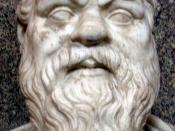A Definition of Justice
In this paragraph Glaucon, who has taken up the argument from Thrasymachus, makes his definition of justice. He states that justice is a compromise of sorts between advantage and fear. People understand that being unjust is often to their advantage; however, they also fear being the victim of injustice. If they could act unjustly without suffering the consequences they would. This partially explains Thrasymachus? earlier definition of justice as the advantage of the strong. No reason exists for a person who can act unjustly to their own benefit without being the subject of injustice themselves not to. Justice is therefore a reciprocal agreement between peoples too weak to be immune from injustice not to be unjust and is a contract not willingly entered. Glaucon presents this definition as a culmination of previous argument and as an explanation he feels will be suitable to Socrates.
The Republic: Courage
In this paragraph Socrates describes the affect of the selection process for soldiers (also True Guardians).
He states that, just as wool must be properly selected before being dyed if the end product is to have any value, so must soldiers be chosen before being inoculated to the laws and ideals of the city. Soldiers so chosen will absorb and retain the information far better than if no selection process were involved. Socrates then goes on to say that soldiers well chosen would be unwavering in their beliefs, immune to the temptations of fear or pleasure. Immunity to such outside forces would make the soldiers courageous and thus the city would be courageous. Therefore courage is the ability to hold steadfast to a belief even through adversity.





